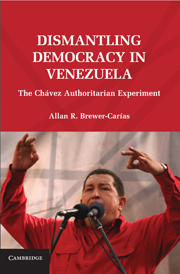Book contents
- Frontmatter
- Contents
- AUTHOR'S NOTE
- INTRODUCTION DEFRAUDING DEMOCRACY THROUGH NONCONSENSUAL CONSTITUENT ASSEMBLIES
- PART ONE THE POLITICAL ASSAULT ON STATE POWERS AND THE FRAMEWORK FOR AUTHORITARIANISM
- Chapter 1 THE 1999 EXCLUSIONIST CONSTITUTION-MAKING PROCESS
- Chapter 2 THE ENDLESS AND ILLEGITIMATE TRANSITORY CONSTITUTIONAL REGIME
- Chapter 3 THE 1999 POLITICAL CONSTITUTION AND THE REINFORCEMENT OF CENTRALIZATION
- Chapter 4 THE 1999 SOCIAL AND ECONOMIC CONSTITUTION AND ITS PROBLEMS
- PART TWO INSTITUTIONAL DEVELOPMENT TOWARD CONSOLIDATING AUTHORITARIANISM
- PART THREE CONSTITUTIONAL REFORMS DESIGNED TO CONSOLIDATE AUTHORITARIANISM
- INDEX
Chapter 1 - THE 1999 EXCLUSIONIST CONSTITUTION-MAKING PROCESS
Published online by Cambridge University Press: 05 June 2012
- Frontmatter
- Contents
- AUTHOR'S NOTE
- INTRODUCTION DEFRAUDING DEMOCRACY THROUGH NONCONSENSUAL CONSTITUENT ASSEMBLIES
- PART ONE THE POLITICAL ASSAULT ON STATE POWERS AND THE FRAMEWORK FOR AUTHORITARIANISM
- Chapter 1 THE 1999 EXCLUSIONIST CONSTITUTION-MAKING PROCESS
- Chapter 2 THE ENDLESS AND ILLEGITIMATE TRANSITORY CONSTITUTIONAL REGIME
- Chapter 3 THE 1999 POLITICAL CONSTITUTION AND THE REINFORCEMENT OF CENTRALIZATION
- Chapter 4 THE 1999 SOCIAL AND ECONOMIC CONSTITUTION AND ITS PROBLEMS
- PART TWO INSTITUTIONAL DEVELOPMENT TOWARD CONSOLIDATING AUTHORITARIANISM
- PART THREE CONSTITUTIONAL REFORMS DESIGNED TO CONSOLIDATE AUTHORITARIANISM
- INDEX
Summary
In December 1999, as a result of the constitution–making process developed during that year, a new Constitution was approved in Venezuela. A national constituent assembly elected that same year sanctioned the new Constitution, which was submitted to popular approval by referendum on December 15, 1999.
As a member of the National Constituent Assembly, participating in all its sessions and in all the constitutional discussions held, I opposed the Constitution and led the political campaign for a no vote in the referendum. This position was based on my multiple negative votes in the Constituent Assembly and on my publicly expressed fear that the new Constitution, despite its advanced civil and political rights regulations, was an instrument framed for the development of an authoritarian regime. This fear was due to the Constitution's provisions allowing for the possibility of the concentration of state power, state centralization, extreme presidentialism, extensive state participation in the economy, the general marginalization of civil society in public activities, exaggerated state social obligations reflecting state oil-income populism, and extreme militarism.
Unfortunately, the warning signs of 1999–2000 have become reality, and the political system that resulted from the 1999 constitution making has turned out to be the current authoritarian regime, led by former Lieutenant-Colonel Hugo Chávez Frías, a leader of the failed 1992 military coup. Chávez was elected president of the Republic of Venezuela in the general elections of December 1998, elected in 2000 after the approval of the new 1999 Constitution, and reelected in December 2006.
- Type
- Chapter
- Information
- Dismantling Democracy in VenezuelaThe Chávez Authoritarian Experiment, pp. 35 - 68Publisher: Cambridge University PressPrint publication year: 2010



